Sir Stirling Moss tribute: The last of the Titans
"If it's easy, there's no sense of success."
It's now a full seven years since Sir Stirling Moss said these words to me over the course of an interview. Of course, he'd said several other interesting things too, but these words come flying at me, as if they've suddenly been dislodged from some crevice in my brain where they've been hiding away all this time. Maybe it's because I'm stuck, and recalling the sentence he spoke is a way for me to encourage myself. To try and let stray thoughts finally start to come together. See, I'm completely and utterly confounded by the task of having to write about Mr Motor Racing. In an ordinary scenario, I don't suppose that it would be quite so hard. But especially now, I feel like it's so much harder to write about someone as magnanimous, decorated, and as well-liked as Moss. A driver about whom so much has already been written.
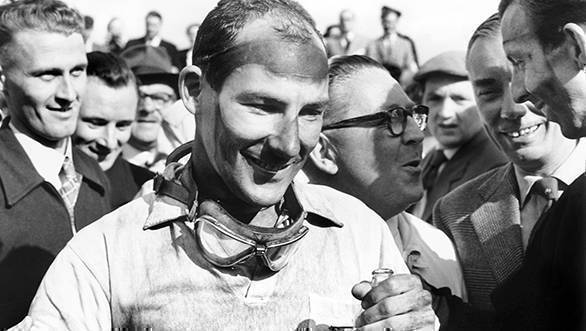 Stirling Moss after winning at Aintree in 1957, with Tony Brooks (right)
Stirling Moss after winning at Aintree in 1957, with Tony Brooks (right)
From the day that he peacefully passed away - April 12, 2020 - countless tributes to the great man have poured in. Some by people who've known him closely for a number of years. Others by people who have actually watched him race when they were young. I haven't had the privilege of having done either. I only came into the world a full 25 years after Moss's career-ending accident at Goodwood in 1962. And I only interviewed him once, a full 50 years after that accident. And by some strange twist of fate, I find myself typing these words out exactly 58 years, to the day, after that accident. It was on April 23, 1962 that Stirling Moss crashed his Lotus during the Glover Trophy at Goodwood. And today (at the time of writing this story), on April 23, 2020, I'm clicking away at my keyboard. Trying to write about Moss. I haven't planned any of this. Nevertheless, it's a coincidence that's given me goosebumps.
***
"To me, to drive a car fast is exhilarating. And you must never frighten yourself but you're very close to it. You go as close as you can to fear."
I first properly encountered Stirling Moss through the black and white photos in a book called Formula 1: The Unseen Archives by Tim Hill. By this I mean Stirling Moss the racing driver. Not Stirling Moss, former Formula 1 driver and Mille Miglia legend. In the black and white pages of that book, was a young Stirling Moss, back in 1951, still hoping to make his mark in motor racing. Amidst the pictures of Giuseppe Farina, Juan Manuel Fangio and Alberto Ascari, who by then were already established names in racing, and looked like they'd weathered a storm or two, Moss' fresh-faced youth stood out to me. As did his story - one of a young man who seemingly excelled at everything he tried, but ultimately decided that he simply was going to make his mark in race cars. And he'd do it his way - preferably in British machinery, and always driving as fast as he could, even if it meant losing a race. And not only with an acceptance of the risks that motor racing involved, but instead by wholeheartedly embracing that risk.
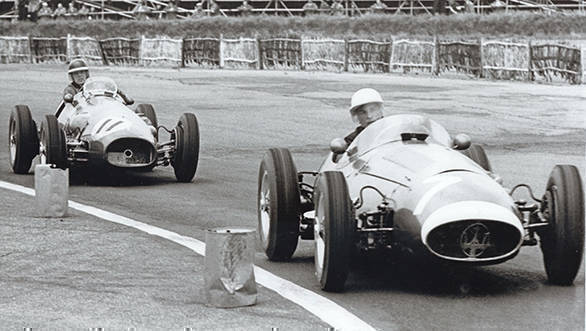 Stirling Moss in his Maserati 250F leads Mike Hawthorn's Ferrari at the 1956 British GP at Silverstone
Stirling Moss in his Maserati 250F leads Mike Hawthorn's Ferrari at the 1956 British GP at Silverstone
As a young 'un myself, also full of hopes and dreams, it was hard not to take a liking to this person, with an almost Gene Kelly-esque charm, from the photographs. Flipping through the pages, I found myself hoping to read of Moss' title success, which is funny. After all, I already knew that he was the "greatest driver never to win a world championship". But that book made me travel back in time, and even armed with the knowledge of the future, I found that I was still rooting for Stirling Moss.
***
"To me motor racing is exciting. It's exciting because I'm risking my life. Because I have to have confidence that what I'm doing is all right."
In 2011, at Chater's Motoring Books at Brands Hatch, I found a copy of All But My Life, Moss's account of his own time in motor racing, as told to prolific writer and journalist Ken W. Purdy. The book was published in 1963, a year after Moss's accident. And it begins with Moss talking to Purdy, as he lies recovering in the hospital, after coming out of a month-long coma following the Goodwood crash. While so much of what I'd read about Moss until then had touched upon why the world thought he was good - here finally was Moss in his own words. Moss, confident, daring, charismatic, and frank. Most of all, respectful.
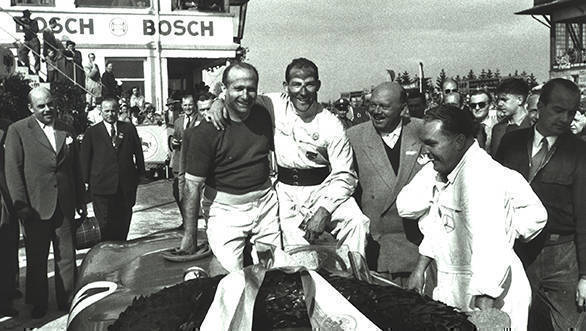 Moss and Fangio had a relationship of mutual admiration and respect
Moss and Fangio had a relationship of mutual admiration and respect
Of course there are drivers over the years who've been open about their rivals' talents. But, possibly, not quite as generously as Moss so often was. Consider these lines: "Fangio could get into an absolute bastard of a car and draw the maximum out of it; or get into a beautiful car and take everything there was in it." Or this: "The best classroom of all time, I'm convinced, was the spot about two car-lengths behind Juan Manuel Fangio. I learned more there than I ever did anywhere else." Or, while making a point about whether championship titles really were an accurate measure of a driver's talents. "Fangio won it five times. If I won it six times, would that make me a better driver than Fangio? No, it wouldn't. Winning it six times won't make me as good a driver as Juan Manuel Fangio, and winning it ten times wouldn't make me a better driver, because I am not. Fangio was better than I was, and that's that."
To me, Moss's dealings with Fangio in Formula 1 made for the greatest possible lesson in the value of humility. In never shying away from being generous with praise where it was due. And in ensuring that the pettiness and jealousy, that can so often creep in during any sort of competition, didn't.
***
"One should be very careful that you should not be too confident. Now, not so much, but it used to be that motor racing was a very dangerous thing. We'd lose two or three people every year because it was that dangerous."
Despite all the praise that Moss heaped on Fangio, he wasn't unaware of his own talent behind the wheel. In fact he seemed to know his own strengths very well. Nonetheless, he still had some doubts as to whether or not he won his first F1 race - the 1955 British Grand Prix at Aintree - fair and square. For years people believed that Fangio had handed Moss the victory, allowing him the experience of winning in front of his home crowd. They were in equal machinery, being teammates that year, both in the Mercedes-Benz W196, and Moss had been faster during qualifying, and thus on pole. On the one hand, given that they were in essentially the same car, Moss believed Fangio couldn't have made his way past, unless he'd had another 40PS. At the same time, he worried about that victory enough to go ask Fangio if he'd gifted him the win. Till the day he died, Fangio's response was that Moss had simply been faster that day.
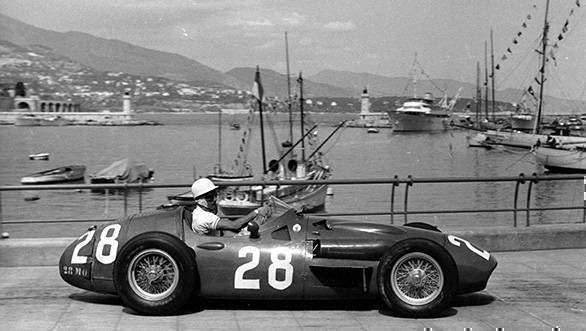
This curious combination of Moss's acknowledgement of how good he was behind the wheel of a race car, combined with this self-doubt that he felt, was another thing that always stuck in my mind. It seemed as though a healthy amount of confidence was required if one needed to be successful. But the odd bit of uncertainty about one's own abilities would keep one honest, and prevent complacency from setting in. It would force the wheels to remain in motion, keeping rust at bay. It seemed like a good way to go about life, really.
***
"I was always concerned, but not to the point that it upset my sleep or anything. Once the flag goes down, you go!"
Even though Moss might not have won a championship title in an F1 car, he had several very memorable outings in the sport. That first win at Aintree was a sign of things that were to come. Over the course of the next seven years, he would never finish lower than third in the world championship standings. And between 1955 and 1958, he finished runner-up in the championship four consecutive times. Were 16 Formula 1 wins the best that Moss could have done? Certainly not. But his desire to drive British cars hampered his progress, and reflected in the results. However reluctantly he might have done it though, Moss eventually gave up on driving only British machines for a while. After all, he was a racing driver, who wanted to get on with it, and was keen on giving himself a chance to fight for race wins and titles. Within Formula 1 some of those wins came in the Mercedes-Benz W196, and a Maserati 250F. And there's simply no way to talk about Stirling Moss without talking about his absolutely glorious time in sports cars, and that masterful drive in the Mercedes-Benz 300 SLR at the 1955 Mille Miglia. Moss and co-driver Denis Jenkinson completed the 992-mile course in a time of 10 hr 7min 48sec, averaging a speed of 99mph (160kmph). 'Jenks' as he was popularly known, had developed a series of hand signals to make communicating over the engine noise easier, and Moss was able to tackle the route with great commitment, taking blind crests at speeds that would make most mere mortals quake. When he won the Mille Miglia, Moss became only the second-ever non-Italian to win the event. Their average speed over the course of the narrow Italian country roads is a record that remains unbroken till today.
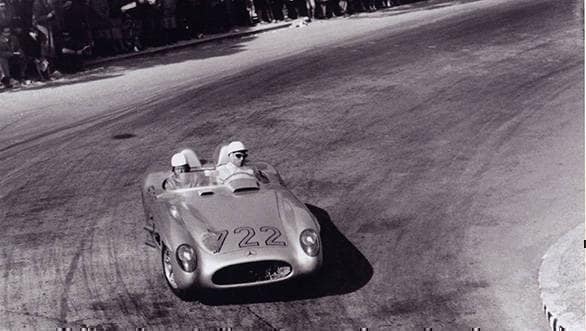 Moss drove the 722 Mercedes-Benz 300SLR to a historic victory at the 1955 Mille Miglia
Moss drove the 722 Mercedes-Benz 300SLR to a historic victory at the 1955 Mille Miglia
Imagine if Moss had held fast to his principles of only driving in British machinery? So fast, that instead of ending up in a competitive car, he ended up carrying right on in uncompetitive machinery? What then? Would we have really called him Mr Motor Racing? Would we have realised just how good he was? It's unlikely. Which is why I've always been grateful to Stirling Moss for changing tracks, however reluctantly he may have done it. For having the courage to go be a proper racing driver, in whatever machine he managed to get his hands on that would allow him to really give things a go. It allowed me to realise that there was no shame in changing one's mind on occasion. And that the temptation to be rock solid in one's beliefs, could sometimes cause more harm than good.
***
"If I say to you let's play cards and we play for chips, you're still going to want to win. But if I say let's put dollars down, it becomes much more important, doesn't it? But if I say you could lose your life, it's the most important thing."
Moss's crash at Goodwood was bad for two reasons. One, there was something mysterious about it, in that the "whys" of it were never quite solved. And the second was because of its severity. Moss had attempted to get past Graham Hill, when his Lotus veered off course, and he crashed heavily. It took rescuers over 40 minutes to cut him out of the wreckage. He spent a full month in a coma in the hospital, and then spent the next six months after regaining consciousness, paralysed on one side of his body. When he finally attempted to make a motorsport return, Moss tested a Lotus 19 and found himself to be slower than he'd have liked. And when he realised that he wouldn't be as good as he'd once been, he decided to quit the sport. And after he quit, he simply got on with life.
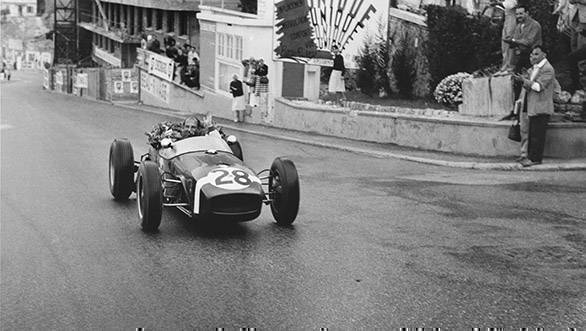 After winning the 1960 Monaco GP in the Lotus 18, though it's his heroic drive in 1961 that's best remembered
After winning the 1960 Monaco GP in the Lotus 18, though it's his heroic drive in 1961 that's best remembered
I've scoured many automotive publications, read every Stirling Moss interview I've come across, and have even dipped back into my copy of All But My Life a few times. What's always struck me is the quiet dignity with which Moss handled his career in racing, and his departure from it. He never once spoke of any of it with regret, and didn't seem to bother himself with what could have been, or what should have been. It was what it was, and Moss was seemingly okay with it. It was only years later that he would admit that he wished he had given himself proper time to recover, instead of rushing back into a car, and then being unable to do as well as he'd have liked. There was a certain nobility to everything that Moss did - the way he celebrated victories, the way he took defeat on the chin without letting it knock him to the ground, and the way he handled all the near misses.
***
"People say I had a death wish, which is ridiculous. I love life!"
Back in 2013, sitting in the lobby of a hotel in Mumbai, it was hard to reconcile the image of that young boy I'd first seen in those black and white photos, with the elderly gentleman before me. Sitting there in a paisley print shirt, his carbon-fibre walking stick beside him, and, of course, a cup of tea in his hand, the then 83-year old Moss seemed somewhat avuncular. One could hardly believe that it was the same man, renowned for his fastidiousness, who kept meticulous scrapbooks of all his media interviews over the years. And that same man who was infamous for being a bit of a rogue, and who kept scrapbooks of all the dalliances he had with members of the opposite sex! But the minute he began to talk about his time in motor racing, he transformed back into Sir Stirling Moss. "Every driver, every driver I ever passed, I thanked him, or shook my fist at him. One or the other. Either he was being decent or he was being a bastard and so he'd know!" he'd chuckled. And he'd said so much more - all the quotes that you see in bold have been pulled from that same interview seven years ago. Somehow, they stand the test of time.
***
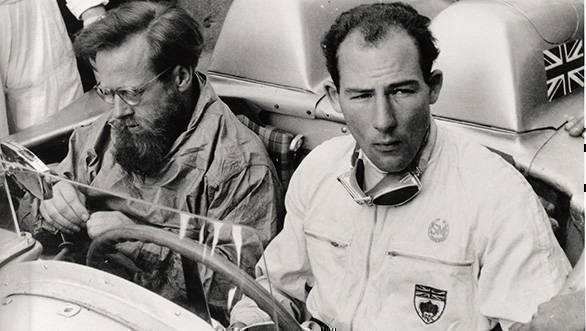 With Denis Jenkinson by his side. Their record of averaging 160kmph over nearly 1,600km remains unbeaten to this day
With Denis Jenkinson by his side. Their record of averaging 160kmph over nearly 1,600km remains unbeaten to this day
I've spent the last few days thinking rather a lot about Moss. Trying to understand why he occupied the sort of place in motor racing history that he did occupy. Why he was as well-liked as he was - he'd said the odd off-coloured thing over the years, that landed him in hot water, but was always forgiven. Why he was so universally accepted as the very manifestation of everything a racecar driver should be. And my mind at once turns to black and white images again. There's a moving picture playing in my head, of Moss leaning out of his car at the 1958 Portuguese Grand Prix, shouting out words of advice to Mike Hawthorn, urging his rival to get his car started again. And of Moss then defending Hawthorn to the stewards, preventing him from being disqualified from the race. And of Moss winning the 1961 Monaco Grand Prix in an outdated Lotus-Climax. Of how his genius and his skill trumped everything else on the tight and twisty streets of Monte Carlo that year. And I find myself picking up that copy of All But My Life yet again, and flipping to the pages where Moss tells Purdy how his accident at Goodwood transformed him - while he had always been honest himself, he now demanded complete honesty from everyone else too. Anything even remotely dishonest bothered him immensely. And then things become clear.
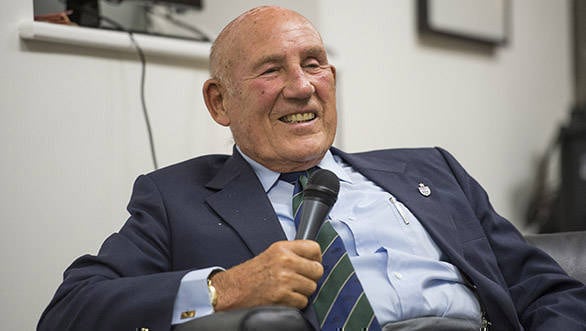
See, Moss' appeal lay not just in the fact that he represented to us an era of motor racing gone by. Instead, he honestly and authentically was the very embodiment of the golden age of motor racing. It takes a special sort of person to be so completely and entirely timeless. And it is the rare individual who is able to represent a period of time gone by without ever slowly morphing into a cobweb-covered relic, or any sort of antiquity, himself. And while Stirling Moss might have embodied the past, he most certainly didn't belong in the past.
There's that old story about the British traffic police stopping people who were driving too fast, and asking them, "Who do you think you are, Stirling Moss?" Well, until the 12th of April 2020, only one man could reply to that question in the affirmative. Now no one ever can. And no one ever will. Because there will never be another Stirling Moss.
Goodbye Mr Motor Racing. Thank you for the memories and the life lessons.
This story first appeared in the May 2020 issue of OVERDRIVE magazine. The digital issue of the magazine can be downloaded for free here.














